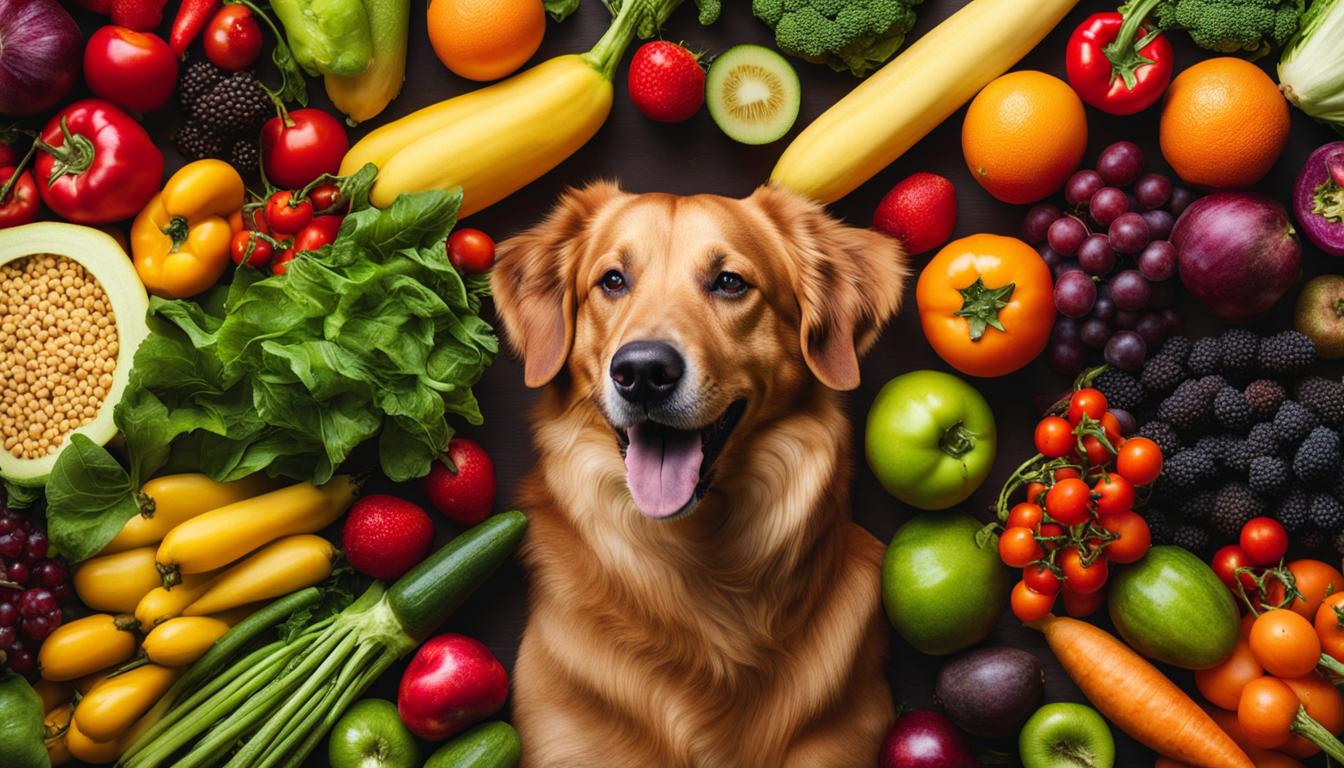Just like humans, dogs require a balanced diet of essential vitamins and minerals to maintain their overall health and well-being. These nutrients play a crucial role in supporting growth, development, immune function, and other important bodily processes in dogs. From the importance of calcium in their diet to the role of zinc in their nutrition, understanding the significance of each vitamin and mineral is essential for keeping your furry friend happy and healthy.
Key Takeaways:
- Providing your dog with essential vitamins and minerals is crucial for their overall health and well-being.
- Calcium is important for strong bones and teeth in dogs.
- Zinc plays a vital role in proper immune function and wound healing in dogs.
- Ensuring a balanced diet that includes a variety of vitamins and minerals is key to supporting your dog’s health.
- Consult with a veterinarian to ensure your dog’s diet is meeting their specific nutritional needs.
The Importance of Vitamins for Dogs
Dogs, just like humans, require a variety of vitamins to support their overall health and well-being. These essential nutrients play a crucial role in maintaining various bodily functions and promoting optimal growth and development. Understanding the importance of vitamins for dogs can help you ensure that your furry friend receives the necessary nutrients for a happy and healthy life.
Vitamin C for Dogs
Vitamin C is an important antioxidant that helps protect your dog from harmful free radicals and strengthen their immune system. It supports collagen production, which is essential for healthy skin, joints, and connective tissues. While dogs naturally produce vitamin C in their bodies, certain situations, such as illness or stress, may increase their requirements. Discussing the appropriate dosage with your veterinarian can help determine if vitamin C supplementation is necessary for your dog.
Vitamin K for Dogs
Vitamin K is vital for proper blood clotting and wound healing in dogs. It helps activate proteins that control blood clot formation, preventing excessive bleeding. While most dogs can obtain vitamin K through their diet, certain conditions and medications may interfere with its absorption. If your dog is on long-term medication or has a health condition that affects blood clotting, your veterinarian may recommend vitamin K supplementation.
Choline for Dogs
Choline is a nutrient that plays a critical role in brain function, liver health, and metabolism. It is involved in the production of neurotransmitters, which are essential for proper cognitive function and behavior. Choline also supports liver function by aiding in the metabolism of fats and preventing the accumulation of fat in the liver. While dogs can produce choline to some extent, adding choline-rich foods, such as eggs or organ meats, to their diet can ensure an adequate supply.
Providing your dog with the essential vitamins they need is essential for their overall health and well-being. While a balanced diet is typically sufficient, it’s important to consult with your veterinarian to determine if supplementation is necessary for your dog’s specific needs. Remember, every dog is unique, and their vitamin requirements may vary based on factors such as age, breed, and overall health.

The Role of Minerals in Dog Nutrition
In addition to vitamins, minerals play a vital role in ensuring the optimal health and well-being of your dog. Calcium, one of the most important minerals, is essential for strong bones and teeth, making it crucial for dogs of all ages. It is particularly important during the growth stages of puppies and in maintaining bone density in older dogs. Including calcium-rich foods, such as dairy products, leafy greens, and bone meal, in your dog’s diet can help meet their calcium needs.
Zinc is another crucial mineral that plays a significant role in dog nutrition. It supports proper immune function and wound healing, making it essential for your dog’s overall health. Foods rich in zinc include meat, eggs, fish, and whole grains. However, it’s important to note that excessive zinc intake can be harmful to dogs, so it’s crucial to consult with a veterinarian to determine the appropriate amount for your furry friend.
Potassium is an essential mineral that is vital for nerve and muscle function in dogs. It helps regulate hydration levels, maintain proper pH balance, and supports healthy heart function. Foods rich in potassium include bananas, sweet potatoes, and spinach. Including these foods in your dog’s diet can help ensure they receive an adequate amount of this important mineral.
Iron is another mineral necessary for your dog’s overall health. It plays a vital role in oxygen transport in the blood, which is essential for energy production and overall vitality. Foods rich in iron include lean meats, liver, fish, and legumes. Ensuring your dog’s diet includes these iron-rich foods can help prevent iron deficiency and support their overall well-being.
| Mineral | Function | Food Sources |
|---|---|---|
| Calcium | Supports strong bones and teeth | Dairy products, leafy greens, bone meal |
| Zinc | Supports immune function and wound healing | Meat, eggs, fish, whole grains |
| Potassium | Regulates nerve and muscle function | Bananas, sweet potatoes, spinach |
| Iron | Necessary for oxygen transport in the blood | Lean meats, liver, fish, legumes |
By incorporating foods rich in these essential minerals into your dog’s diet, you can help ensure they receive the necessary nutrients to support their overall health and well-being. However, it’s important to remember that the specific dietary needs of each dog may vary based on factors such as age, breed, and any underlying health conditions. To provide the best nutrition for your dog, it’s always advisable to consult with a veterinarian who can recommend a balanced diet tailored to their individual needs.
Natural Mineral Rich Foods and Vitamin Supplementation for Your Dog
Providing your dog with a balanced diet that includes natural mineral-rich foods is essential for their overall health and well-being. While commercial dog food is formulated to meet their nutritional needs, supplementing with vitamins may be necessary in certain situations, such as for puppies or dogs with specific health conditions.
When it comes to natural mineral-rich foods, options like lean meats, fish, and eggs are excellent sources of essential minerals like calcium, zinc, and iron. These minerals play a vital role in supporting your dog’s bone health, immune system, and energy production. Incorporating these foods into your dog’s diet not only provides them with necessary minerals but also offers a tasty and nutritious meal.
“A natural, balanced diet that includes mineral-rich foods can contribute to your dog’s overall health and well-being.”
In addition to natural foods, vitamin supplementation may be beneficial for certain dogs. Puppies, for example, have specific nutritional requirements during their growth and development stages. It is important to consult with your veterinarian to determine the appropriate vitamins and dosage for your puppy to support their optimal health.
While supplementing with vitamins can be beneficial, it is crucial to strike the right balance when it comes to vitamins and minerals in your dog’s diet. Consult with your veterinarian to ensure that you are providing the appropriate amounts of vitamins and minerals based on your dog’s specific needs, age, and health conditions. By maintaining a balanced diet that includes natural mineral-rich foods and appropriate vitamin supplementation, you can help your furry friend thrive.

The Benefits of Natural Mineral-Rich Foods and Vitamin Supplementation
- Promotes healthy bone development and maintenance
- Enhances immune function
- Aids in energy production
- Supports overall health and well-being
Tips for Balancing Vitamins and Minerals in Your Dog’s Diet
- Choose high-quality commercial dog food labeled as “complete and balanced” for your dog’s specific life stage
- Incorporate natural mineral-rich foods into your dog’s diet, such as lean meats, fish, and eggs
- Consult with your veterinarian to determine the appropriate vitamin supplementation, especially for puppies or dogs with specific health conditions
- Regularly monitor your dog’s overall health and consult with your veterinarian for any concerns or questions
Remember, providing a well-balanced diet that includes natural mineral-rich foods and appropriate vitamin supplementation is key to ensuring your dog’s optimal health and well-being.
Conclusion
Now that you understand the importance of providing your dog with essential vitamins and minerals, you are well-equipped to ensure their overall health and well-being. While commercial dog food is designed to meet their nutritional needs, it’s always a good idea to consult with a veterinarian to ensure their diet is balanced and tailored to their specific requirements.
Remember, a balanced diet is key to keeping your furry friend in optimal health. By choosing high-quality dog food and including natural mineral-rich foods, you can provide them with the necessary nutrients they need to thrive. Don’t forget that puppies may require vitamin supplementation to support their growing bodies, and senior dogs may benefit from specialized vitamins for their aging needs.
So, whether it’s making sure they get enough Vitamin A for their vision, Calcium for strong bones, or Zinc for a healthy immune system, you have the power to give your dog the best care possible. A happy and healthy dog starts with a balanced diet that includes essential vitamins and minerals.
FAQ
Do dogs need vitamins and minerals?
Yes, dogs, like humans, require a variety of vitamins and minerals to support their overall health and well-being.
What vitamins are important for dogs?
Dogs require a range of vitamins, including Vitamin A for vision and growth, B vitamins for energy metabolism, Vitamin C as an antioxidant, Vitamin K for blood clotting, and choline for brain and liver function.
What role do minerals play in dog nutrition?
Minerals such as calcium are crucial for strong bones and teeth, zinc is important for immune function, potassium for nerve and muscle function, and iron for oxygen transport in the blood.
Can I rely on commercial dog food for my dog’s vitamin and mineral needs?
Yes, commercial dog foods labeled as “complete and balanced” are formulated to provide all the necessary vitamins and minerals. However, it’s important to choose high-quality dog food suited to your dog’s life stage.
What if I feed my dog a homemade diet?
If you feed your dog a homemade diet, it may be necessary to supplement with vitamins to ensure they are getting all the necessary nutrients. Consulting with a veterinarian is recommended.
How can I ensure my dog is getting the right balance of vitamins and minerals?
Providing a balanced diet and consulting with a veterinarian can help ensure your dog’s vitamin and mineral needs are met for their overall health and well-being.





